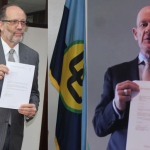TVET professional development goes online

CARICOM Vocational Qualifications (CVQs) Assessors, Verifiers, Instructors now have access to online training to enhance their capacity to ensure that artisans attain the occupational standards required for work within the CARICOM Single Market and Economy (CSME).
On Tuesday, 20 April, the Caribbean Association of National Training Authorities (CANTA) launched a CARICOM Vocational Qualifications Online Training Programme, enabling the continuity of TVET professional development at a distance.
Described, as a watershed moment in CANTA’s existence, it is the result of collaboration involving the Commonwealth of Learning (COL), the National Training Authorities (NTAs) of Grenada, Barbados and Trinidad and Tobago, the Caribbean Development Bank (CDB) and the Caribbean Community (CARICOM) Secretariat.
Programme Manager for Human Resource Development at the CARICOM Secretariat, Dr. Laurette Bristol, chaired the launch event. She lauded the contribution of Immediate Past President of CANTA, Ms. Pauline Whiteman, for advancing the landmark development for CANTA, the apex body for TVET development in the Region.
Ms. Whiteman, she said, “served strategically in getting us to this moment of action, focusing on visibility, sustainability and the impact of CANTA as a regional institution.”
Current Chair of CANTA, Mr. Henderson Eastmond noted that the launch of the Online CVQs Training Programme represented “an important milestone in the work of CANTA.”
Explaining its importance, he said it would strengthen the work of NTAs that do not have enough resources to conduct face-to-face training, and build Member States’ capacity to implement CVQs.
It is an example of regional cooperation; he said, commending the course developers drawn from Trinidad and Tobago, Barbados and Grenada NTAs. He said training with the Online Programme commenced next month.
Chair of CARICOM Council for Human and Social Development (COHSOD), the Hon. Jeffery Lloyd, Minister of Education of The Bahamas congratulated CANTA for “having the insight to provide courses that will provide valuable certification.”

He said the initiative fulfilled one of the goals of COHSOD to promote the development of education through efficient organisation of elementary, advanced, vocational training and technical education and training facilities in the Community.
With the pandemic limiting face-to-face education, he underscored that virtual training was critical. Like the rest of the Community, he said The Bahamas also had faced brick and mortar closure of schools and had to resort to online training. However, he noted, even before the pandemic, the Government of The Bahamas committed to the full digitisation of all public schools. Efforts advanced towards that goal with the distribution of tablets and enhancement of internet connectivity to public and private schools, Minister Jeffery informed participants at the launched.
Lauding the Programme, he said it was developed with the recognition that “steps must be taken to create opportunities for citizens to earn a living, to maintain a decent level of financial stability, to enhance a positive identity and to ensure greater level of self-worth.”
Courses such as this, he said, “provide a critical route to assist with setting a pathway for citizens to engage in lifelong learning and continuous acquisition of life skills.”
He commended the organising team for the provision of the free Online CVQ Training Programme and lauded the Caribbean Development Bank for its support.
“It is imperative for the Region to provide initiatives which will assist school leavers to secure a stable future,” Minister Lloyd stated, noting that CARICOM was committed to retraining and retooling citizens to enter the job market or consider entrepreneurial options.
Keynote speaker at the launch, President of COL, Dr. Asha Kanwar, said the initiative offered practical skills online, blending training at a distance with mentored practice in workplace settings.

She highlighted the importance of Assessors, Verifiers, Instructors in implementation of the CARICOM Single Market and Economy, noting that a key element within the Single Market was the need for qualifications that enabled skilled workers to move and work freely.
“NTAs have a crucial role in certifying workers to agreed standards. They in turn rely on trained assessors, verifiers and instructors to assure quality and consistency across the Region,” she stated.
For TVET, Dr. Kanwar added, the question has always been how to conduct practical training online, when assessment, verification and instruction require “real people showing real skills.” However, NTAs have had to adapt to the use of technology for a number of reasons including the COVID-19 pandemic, she said.
Several cohorts of assessors have already been trained using the Programme during its pilot phase.
“It is time to go for clicks rather that bricks,” Dr Kanwar said, underlining the importance of integrating technology for the sustainability in education.
She shared about the success of COL’s workforce recovery programme, using COURSERA, which offered 3800 courses from 200 top universities in the world including Ivy League universities in the Unites States. The universities provide licenses for COL to offer the courses in the Commonwealth, and she indicated that 67,585 persons had participated from Caribbean. Of those participants, most of the students came from Barbados, Guyana, Grenada and Saint Lucia.
Professor Kanwar said she was pleased to learn that the high uptake from those CARICOM countries was due to high internet connectivity. Against this backdrop, she told Minister Lloyd it was heartening to hear about his government’s effort to strengthen digital infrastructure to facilitate distance education.
“COL is really delighted to be working with you to support a new normal for Assessors, Verifiers and Instructor training. COL hopes it will in turn inspire new models of blended skills development across the region for skill and sustainability,” she stated.
Operations Officer for Education at the CDB, Dr. Martin Baptiste, also spoke at the launch and pledged the Bank’s financial support to the roll out of the programme.
Describing it as timely, he said Borrowing Member Countries have invested heavily in TVET to mainstream CVQs in the education sector.
“Training of Assessors, Verifiers and Instructors is fundamental not only to the viability of delivering CVQs, but to ensure that there is adequate human resource capacity to deliver the programmes in secondary schools, TVET institutions and in projects as they are implemented,” he stated.
He said the CDB had financed training cohorts in Belize, St Kitts and Nevis, Dominica, St Vincent and the Grenadines, Suriname and Guyana, and noted the Bank was “delighted” that the programme was now virtual.
He said CDB was willing to work with CANTA and COL to expand the programme to as many persons as possible, including its translation into French so that TVET professional in Haiti could benefit.
The launch event featured an unveiling of the digital platform by Ms Francis Ruffin of the Grenada NTA.
CANTA is an association of National Training Authorities and other TVET apex bodies in CARICOM states established in November 2003.
The CARICOM Vocational Qualifications, launched in October 2007, facilitate the movement of artisans and other skilled persons in the CSME. Candidates are expected to demonstrate competence in attaining occupational standards developed by practitioners, industry experts and employers.
Source: CARICOM TODAY

 Previous Post
Previous Post Next Post
Next Post